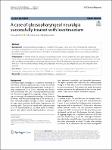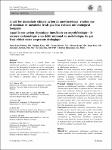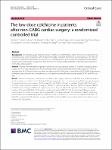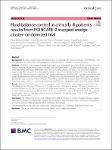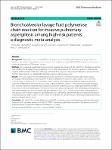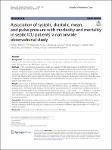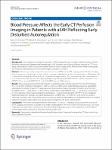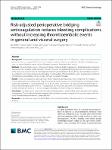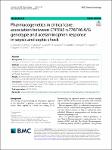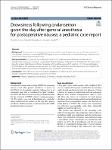Search
Author
- Osman, Ahmed I. (5)
- Daqing, Ma (3)
- Jorgensen, Ed (3)
- Li, Yan (3)
- next >
Subject
- kinh tế (26)
- Economics (12)
- programming (10)
- XRD (10)
- next >
Date issued
- 2020 - 2025 (2129)
- 2010 - 2019 (129)
- 2000 - 2009 (9)
- 1999 - 1999 (1)
Has File(s)
Search Results
Glossopharyngeal neuralgia is a condition that causes severe pain in the throat during swallowing. Although carbamazepine is a viable option for treating glossopharyngeal neuralgia, there are minimal data regarding the effect of alternative agents to treat it. We report on glossopharyngeal neuralgia, which is successfully controlled by levetiracetam. |
Climate change is a global threat, and inhalational anesthetics contribute to global warming by altering the photophysical properties of the atmosphere. On a global perspective, there is a fundamental need to reduce perioperative morbidity and mortality and to provide safe anesthesia. Thus, inhalational anesthetics will remain a significant source of emissions in the foreseeable future. It is, therefore, necessary to develop and implement strategies to minimize the consumption of inhalational anesthetics to reduce the ecological footprint of inhalational anesthesia. |
Recent high-quality trials have shown that the anti-inflammatory effects of colchicine reduce the risk of cardiovascular events in patients suffering post-myocardial infarction and chronic coronary disease. The effect of colchicine in patients undergoing non-coronary artery bypass grafting (non-CABG) with cardiopulmonary bypass remains unclear. We aim to evaluate the effect of colchicine on myocardial protection in patients who underwent non-CABG cardiac surgery. |
In critically ill patients, positive fluid balance is associated with excessive mortality. The POINCARE-2 trial aimed to assess the effectiveness of a fluid balance control strategy on mortality in critically ill patients. |
Polymerase chain reaction (PCR) assays are perceived to facilitate the diagnosis of fungal infections. However, due to lack of standardization, the value of bronchoalveolar lavage (BAL) fluid PCR in diagnosis of invasive pulmonary aspergillosis (IPA) remains unclear. |
Intensivists target different blood pressure component values to manage intensive care unit (ICU) patients with sepsis. We aimed to evaluate the relationship between individual blood pressure components and organ dysfunction in critically ill septic patients. |
Early computed tomography perfusion (CTP) is frequently used to predict delayed cerebral ischemia following aneurysmatic subarachnoid hemorrhage (aSAH). However, the influence of blood pressure on CTP is currently controversial (HIMALAIA trial), which differs from our clinical observations. Therefore, we aimed to investigate the influence of blood pressure on early CTP imaging in patients with aSAH. |
Perioperative bridging of oral anticoagulation increases the risk of bleeding complications after elective general and visceral surgery. The aim of this study was to explore, whether an individual risk-adjusted bridging regimen can reduce bleeding events, while still protecting against thromboembolic events. |
Pharmacogenetics could represent a further resource to understand the interindividual heterogeneity of response of the host to sepsis and to provide a personalized approach to the critical care patient. |
Ondansetron is an antiemetic drug that is useful not only for prevention but also for the treatment of postoperative nausea and vomiting (PONV). We report a rare case of drowsiness in a child after using ondansetron for nausea on the day after general anesthesia. |

